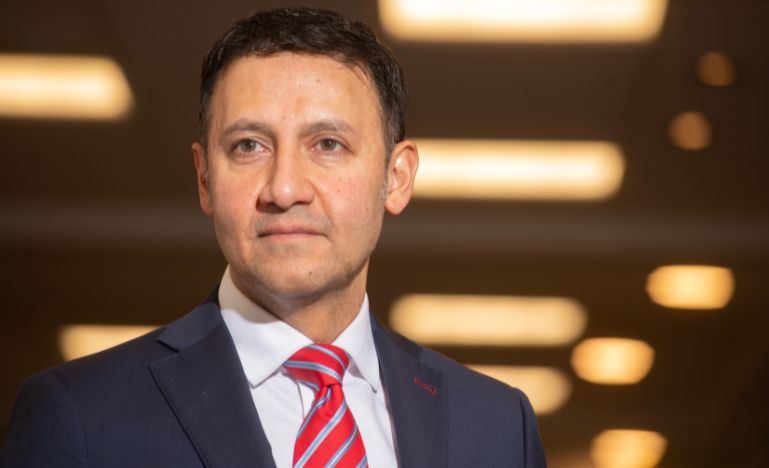Pourvoir les postes vacants et renforcer les institutions judiciaires
Le ministre de la Justice annonce à l’AGA de l’ABC qu’il ne reste plus que 31 postes à pourvoir, tandis que le juge en chef de la CSC souligne l’importance du bien-être des membres de la magistrature

À ce jour, il ne reste plus que 31 postes à pourvoir à la magistrature fédérale au Canada.
Prenant la parole à l’Assemblée générale annuelle 2025 de l’Association du Barreau canadien à Toronto, le ministre fédéral de la Justice, Arif Virani, a informé les membres que ce nombre était beaucoup plus bas qu’au cours des dernières années. Au début de 2023, il y en avait 92 postes à pourvoir. Il a ajouté qu’il avait obtenu le taux le plus rapide de nominations à la magistrature de tous les ministres de la Justice de l’histoire du pays.
« Depuis que je suis devenu ministre de la Justice il y a 19 mois, j’ai nommé 202 juges à des cours supérieures et à des cours d’appel au Canada. Le gouvernement précédent nommait environ 65 juges par année. Au cours de ma première année, j’en ai nommé 137. »
Le ministre Virani a réitéré que la résolution de cette question reste l’une de ses priorités, car elle a suscité de nombreuses inquiétudes ces dernières années. Dans une lettre adressée au premier ministre Justin Trudeau en 2023, l’ABC et son Sous-comité des questions judiciaires soulignaient que, dans certains tribunaux du Canada, il y avait jusqu’à 10 ou 15 % de postes vacants à la magistrature, ce qui a mené à l’abandon de nombreuses affaires criminelles en raison de retards et a créé un arriéré de causes civiles.
Ministre Virani s’est dit fier des « brillants penseurs et chefs de file du milieu juridique » qui siègent maintenant à la magistrature. Parmi les 202 juges qu’il a nommés, la moitié sont des femmes, 48 sont des personnes de couleur et le nombre de nominations parmi les juristes autochtones a presque quintuplé.
« Les Canadiens peuvent se sentir représentés dans les plus hauts tribunaux du pays. Cela a une incidence directe sur le renforcement de leur confiance dans nos tribunaux et dans l’administration de la justice au Canada », a dit le ministre, soulignant comme exemple la Cour suprême du Canada, qui a nommé sa première juge autochtone et son premier juge racialisé.
Il ajoute qu’avec la nomination de la juge Marie Moreau en 2023, la majorité de la magistrature de la cour se compose de femmes pour la première fois dans l’histoire du Canada.
« C’est quelque chose dont aucun autre pays du G7 ne peut se vanter », a noté le ministre Virani.
Il a remercié les membres de l’ABC pour leurs nominations aux comités consultatifs judiciaires, qui examinent les candidatures à la magistrature. Il avait également un message simple à adresser aux membres qui envisagent de briguer la magistrature : présenter votre candidature.
« Vous êtes la magistrature de demain. »
À un moment où certaines personnes, ici et à l’étranger, cherchent à miner la confiance dans les tribunaux et dans les institutions judiciaires, et où certaines des valeurs chères aux juristes et aux Canadiens sont menacées, le ministre a également exhorté les membres à rester vigilants.
« Je fais appel à vous, en tant que collègues, dans l’exercice de notre profession », a-t-il dit.
« La primauté du droit est une entité précieuse. Notre adhésion à ce principe est la raison pour laquelle le Canada est considéré comme l’un des meilleurs endroits au monde. Les droits et libertés que nous confère la Charte sont tout aussi précieux. Nous devons les protéger et nous défendre les uns les autres, en particulier les plus vulnérables de la société. »
C’est pour cette raison, selon M. Virani, que le gouvernement fédéral interviendra lorsque la Cour suprême entendra une contestation du projet de loi 21 du Québec.
Il a ajouté que la profession juridique s’est levée à plusieurs reprises au cours de certaines des périodes les plus difficiles de l’histoire.
« En tant que juristes, vous êtes sur la ligne de front dans la lutte pour les droits de la personne, pour la dignité, pour l’égalité, et vous êtes les personnes qui demandent des comptes aux gouvernements. Ce travail est plus nécessaire que jamais. »
Le juge en chef de la Cour suprême Richard Wagner a également abordé le rôle de la Cour et de la profession juridique dans le renforcement des institutions judiciaires.
S’exprimant par téléconférence depuis Victoria, où la Cour se rend dans le cadre de son 150e anniversaire, il a souligné que les anniversaires sont des occasions de réfléchir aux défis et aux possibilités.
« La confiance du public est le fondement de notre travail. Sans elle, la magistrature ne peut remplir son rôle, » a-t-il dit.
Il a rappelé aux membres de l’ABC qu’ils ont un rôle clé à jouer en tant que représentants et représentantes de la profession juridique.
« Vous êtes les architectes du pont qui relie le public au système de justice. »
Soulignant que le bien-être général des juges profite également au système judiciaire, le juge en chef Wagner a salué le travail novateur accompli par l’ABC et ses partenaires pour comprendre la santé mentale au sein de la profession juridique.
« Cela a inspiré le CCM (Conseil canadien de la magistrature) à lancer une étude sur le bien-être des juges. Les résultats fourniront des informations précieuses qui éclaireront de futures initiatives », a-t-il dit.
Lynne Vicars, présidente de l’ABC, s’est adressée aux participants et leur a dit que, compte tenu du contexte politique actuel, il est plus important que jamais de travailler au renforcement de la confiance dans nos institutions judiciaires.
« Face à ces défis, l’ABC se présente comme une force unificatrice, une source de talent et de nouvelles idées, et un défenseur essentiel de la communauté juridique et des principes que nous chérissons tous », a-t-elle dit.
Me Vicars a mentionné que les tribunaux ne peuvent pas faire leur travail s’ils ne disposent pas des ressources dont ils ont besoin. C’est pourquoi il est crucial que les membres de la profession continuent de rappeler à nos représentants élus et au public que notre système de justice existe afin de préserver l’équité et l’impartialité pour tous.
Bianca Kratt, c.r., vice-présidente de l’ABC a annoncé l’élection de Loreley Chekay, c.r., membre du Conseil d’administration de l’ABC en provenance de la Saskatchewan, au poste de vice-présidente pour l’année 2025-2026. Me Chekay est vice-présidente à la direction et avocate générale de la Saskatchewan Government Insurance. Elle se spécialise dans les conseils sur les risques, la saine gestion publique et l’intégration des principes juridiques dans divers secteurs d’activité. Membre de longue date de l’ABC, Me Chekay a été présidente de la Division de la Saskatchewan et a été active dans plusieurs sections de la Saskatchewan et du pays. Elle préside actuellement le Comité des finances de l’ABC.
Les sept résolutions débattues lors de l’AGA ont été adoptées. Nous vous invitons à lire une couverture plus détaillée sur cette partie des délibérations.


